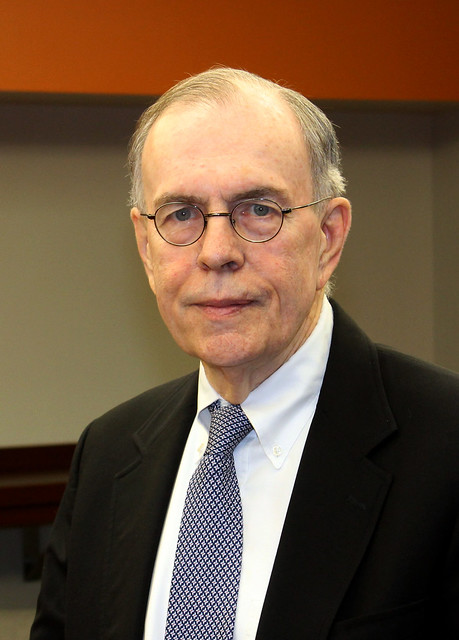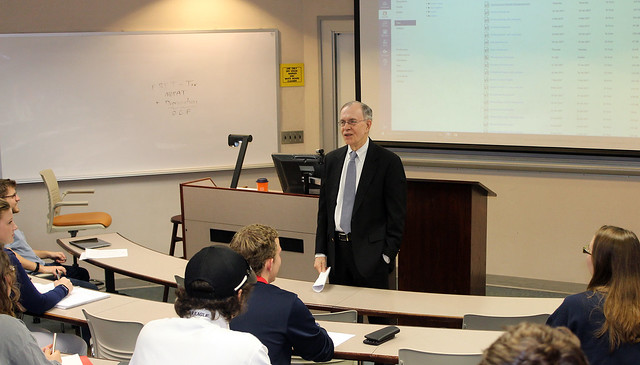SEC's Auburn University Faculty Achievement Award presented to James Barth
Article body
Auburn University Professor James Barth will receive the Southeastern Conference's Auburn Faculty Achievement Award for 2017.
Barth, who serves as the Lowder Eminent Scholar in Finance in the Raymond J. Harbert College of Business, will receive a $5,000 honorarium from the SEC, and he becomes Auburn's nominee for the SEC Professor of the Year, who will be selected from 14 nominees representing SEC universities.
"We appreciate Dr. Barth's dedication to scholarly research and academic excellence on financial issues and markets around the world,” said Jay Gogue, president of Auburn University and past president of the Southeastern Conference.
The SEC Faculty Achievement Awards, created to recognize faculty accomplishments, scholarly contributions and discoveries, were established by the SEC presidents and chancellors and are administered by the SEC provosts. The awards were first presented in 2012.
“Professor Barth is widely regarded as an international finance authority whose expertise is highly valued by the industry," said Timothy R. Boosinger, Auburn University provost and vice president for academic affairs. “His commitment to teaching and scholarship have earned him a distinguished reputation as a foremost authority for global banking regulation and reform.”
Each recipient of the SEC Faculty Achievement Award must be a full professor at an SEC university, have a performance history of extraordinary teaching and a record of scholarship that is recognized nationally or internationally.
“I am truly honored by this award and am extremely grateful for the support provided by the leadership of Auburn University,” Barth said.
In addition to his professorship at Auburn, Barth is a senior fellow at the Milken Institute and a fellow at the Wharton Financial Institution Center. His research focuses on financial institutions and capital markets, both domestic and global, with special emphasis on regulatory issues.
Barth, who has testified before U.S. Congressional committees on banking issues, has authored more than 300 articles in professional journals and has co-authored and co-edited several books. His most recent books are “Guardians of Finance: Making Regulators Work for Us,” MIT Press in 2012, “Fixing the Housing Market: Financial Innovations for the Future,” Wharton School Publishing-Pearson in 2012, and “Research Handbook on International Banking and Governance,” MIT Press in 2012.
He was an appointee of Presidents Ronald Reagan and George H.W. Bush as chief economist of the Office of Thrift Supervision and previously the Federal Home Loan Bank Board. He has also held the positions of professor of economics at George Washington University, associate director of the economics program at the National Science Foundation and Shaw Foundation Professor of Banking and Finance at Nanyang Technological University. He has been a visiting scholar at the U.S. Congressional Budget Office, Federal Reserve Bank of Atlanta, Office of the Comptroller of the Currency and the World Bank.
He served as leader of an international team advising the People's Bank of China on banking reform. Barth also participated in the U.S. Speaker and Specialist Program of the U.S. Department of State in China in 2007, India in 2008, Russia in 2009 and Egypt in 2010. Also in 2008, Barth spoke at the G-20 Workshop on Competition in the Financial Sector in Bali, Indonesia.
He has been quoted in publications ranging from the New York Times and Wall Street Journal to Barron's and Newsweek, and has appeared on various broadcast programs and National Public Radio. Barth is the overseas associated editor of the Chinese Banker and included in Who's Who in Economics: A Biographical Dictionary of Major Economists, 1700 to 1995.
Related Media
Media interested in this story can contact Communications Director Preston Sparks at (334) 844-9999 or preston.sparks@auburn.edu.
Auburn University is a nationally ranked land grant institution recognized for its commitment to world-class scholarship, interdisciplinary research with an elite, top-tier Carnegie R1 classification, life-changing outreach with Carnegie’s Community Engagement designation and an undergraduate education experience second to none. Auburn is home to more than 30,000 students, and its faculty and research partners collaborate to develop and deliver meaningful scholarship, science and technology-based advancements that meet pressing regional, national and global needs. Auburn’s commitment to active student engagement, professional success and public/private partnership drives a growing reputation for outreach and extension that delivers broad economic, health and societal impact.






